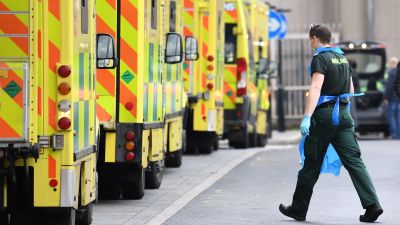University Hospitals Birmingham NHS Trust 'requires improvement', say inspectors

University Hospitals Birmingham NHS Trust has been downgraded to 'requires improvement'.
It's of the largest hospital trusts in England.
A report by the Care Quality Commission found that patient safety was being compromised. The Trust says it's already working to address the issues raised.
The trust - which runs the Queen Elizabeth, Heartlands, Good Hope and Solihull hospitals - was issued the news today after being told they need to improve with inspectors ruling patient safety was being compromised.
Emergency patients were waiting too long on ambulances, while people waiting in A&E were not always checked on.
The Care Quality Commission (CQC) made the discovery during an unannounced visit in September.
Following the inspection, the trust’s overall rating moves from good to requires improvement, and its rating for being well-led moves from outstanding to good.The trust’s ratings for whether care was safe and responsive to people’s needs move from good to requires improvement. It remains rated good for whether its services are effective and caring.Fiona Allinson, CQC deputy chief inspector of hospitals, said:“Our inspection identified concerns regarding the oversight of risk and the steps being taken by the trust’s leadership team to support staff to mitigate this – particularly in relation to urgent and emergency care and surgical services.“We also found variation in the extent to which staff felt respected, valued and supported to carry out their roles, with some staff telling us their concerns about patient care were not listened to or acted upon by the trust’s leadership.“There were concerning disparities in processes and guidance across hospital sites since the acquisition of Heart of England NHS Foundation Trust in 2018, and some staff expressed concern about the impact of this on patient safety.“However, despite the unprecedented challenges the trust faced throughout the COVID-19 pandemic, the workforce remained unwavering in its focus on the needs of patients.“We saw that patients were treated with compassion and kindness, and there were some areas of good and outstanding practice – particularly in cancer services at Queen Elizabeth Hospital Birmingham.“We continue to monitor the trust closely to support it where it must improve, and to help it sustain areas where it is meeting high standards for patients.”
At the time of the inspection, the emergency department at Birmingham Heartlands Hospital was under significant pressure, with extremely high numbers of patients attending.Inspectors found patients waiting to be seen in the department were not always monitored effectively, and safety checks on equipment were not always completed.Where lack of space in the department led to patients waiting outside on ambulances, appropriate steps were not consistently taken to ensure patient safety. This was despite staff raising concerns about the risks created by overcrowding.Inspectors also identified some outstanding practice, especially in Queen Elizabeth Hospital Birmingham’s cancer services. Its haematology department demonstrated European-leading therapies and shared its knowledge with other services.Similarly, trailblazing work was underway on blood tests with potential to diagnose over 50 types of cancer.
In response to the report, Prof David Rosser, Chief Executive, University Hospitals Birmingham NHS Foundation Trust, said: “We are pleased that the CQC have recognised the incredible efforts of our staff in helping the people of Birmingham and Solihull through the pandemic, in the face of by far the highest number of hospitalised patients in the country.
“The findings of the report reinforce the challenges we are aware of, and are actively addressing, particularly in supporting our emergency departments, where we continue to experience extraordinary demand that has a knock-on impact in all areas of our Trust, including urgent and elective surgery.